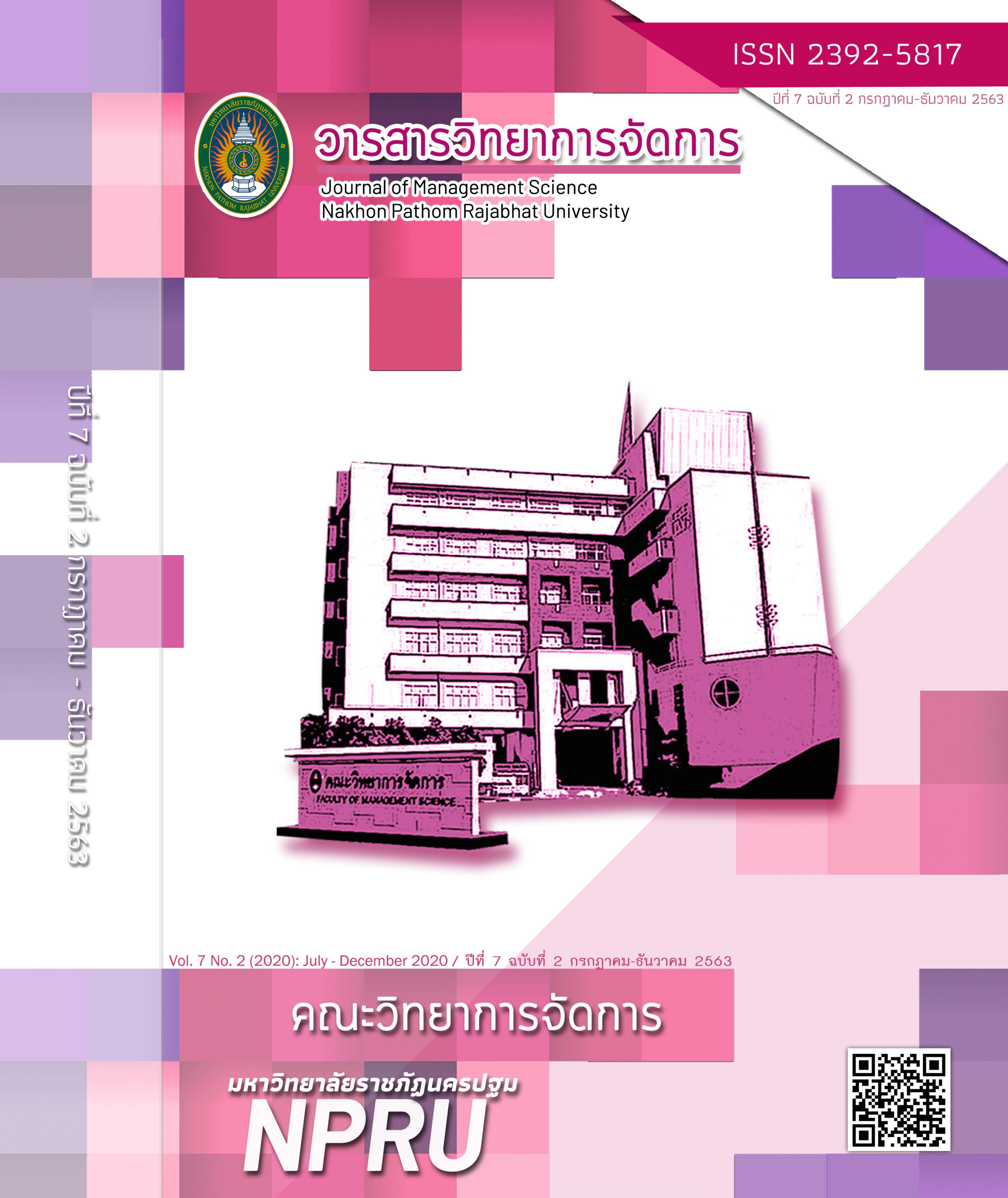Street Vending Management According to The Policy of Bangkok.
Main Article Content
Abstract
The research paper aimed to: 1) study the current problems on street vending in Bangkok: 2) study the policy of street vending management in Bangkok: and 3) to recommend problems, obstacles and solutions to the occupational situation of street vendors, as well as policies or measures for the street vending management in Bangkok. The qualitative research method was conducted by in-depth interviews from a group of 25 key informants. The research instruments were interview questionnaires and analysis, reading results, interpreting and conclusions by analyzing qualitative data revealed instead of the facts as follow:
1. From the current problems in the street vending management in Bangkok, the socio-economic situation is a reflection of the traditional way of life in street vending. The products sold represent the cultural and urban way of the informal economy, which are the drivers for distribution in the community to the current street vending career.
2. The policy of street vending in Bangkok in term of the policy of Act on the Maintenance of the Cleanliness and Orderliness of the Country, B.E. 2535, which is clear to cover the implementation of the policy and suitable for the area conditions but there are limitations on the number of staff and insufficient budgets, which have not been achieved by many factors.
3. Based on research findings are as follow:
3.1) Establish a policy to promote and support the career development of street vendors, such as investment lending, other career advancement with higher income and security in order to permanently reduce the number of street vendors.
3.2) Use control methods in terms of the number of street vendors and the controls on the area permitted to trade, and to promote orderliness and hygiene in the areas permitted for trade.
3.3) Coordinated cooperation of street venders and residents held a meeting to educate traders to adjust the attitude of policy implementation was a satisfying achievement.
3.4) Tackling problems that cause poverty and increasing development opportunities for people and rural areas, both at the macro and micro level, which can be a permanent solution to the street vending problems.
Article history: Received 16 June 2020
Revised 28 October 2020
Accepted 2 November 2020
SIMILARITY INDEX = 0.00 %
Article Details
The views and opinions of the article appearing in this journal are those of the author. It is not considered a view and responsibility of the editorial staff.
References
กรุงเทพมหานคร, สำนักผังเมือง, กองนโยบายและแผนงาน. (2555). รายงานการศึกษาเรื่อง หาบเร่-แผงลอยในกรุงเทพมหานคร ปี พ.ศ. 2555. กรุงเทพมหานคร: ผู้แต่ง.
นฤมล นิราทร (2560). การบริหารจัดการการค้าข้างทาง (Street Vending) ในประเทศไทย : สถานการณ์และทิศทางนโยบายที่ควรจะเป็น. รายงานการวิจัย. มหาวิทยาลัยธรรมศาสตร์.
นฤมล นิราทร. (2557). การจัดการการค้าหาบเร่แผงลอยในกรุงเทพมหานคร: ข้อสังเกตและข้อเสนอแนะ. วารสารสังคมวิทยามานุษยวิทยา, 33(2), 47-72.
พระราชบัญญัติรักษาความสะอาดและความเป็นระเบียบเรียบร้อยของบ้านเมือง พ.ศ. 2535. (2535). ราชกิจจานุเบกษา, 109 (15), 28-42.
วรากุล อุดมประมวล. (2558). ประสิทธิภาพในการนำนโยบายการจัดระเบียบหาบเร่-แผงลอยไปปฏิบัติ : ศึกษาเฉพาะกรณีเขตมีนบุรี กรุงเทพมหานคร. วิทยานิพนธ์รัฐศาสตรมหาบัณฑิต สาขารัฐศาสตร์. มหาวิทยาลัยรามคำแหง.
วรเดช จันทรศร. (2547). ทฤษฎีการนำนโยบายไปปฏิบัติ. กรุงเทพมหานคร: สำนักพิมพ์สหายบล็อกและการพิมพ์.
สุจิตรา สามัคคีธรรม (2561). พฤติกรรมทางเศรษฐกิจของหาบเร่แผงลอย: กรณีศึกษาเขตบางเขน. วารสารร่มพฤกษ์ มหาวิทยาลัยเกริก, 35(3), 157-176.
อุทัย เลาหวิเชียร.(2543). รัฐประศาสนศาสตร์: ลักษณะวิชาและมิติต่าง ๆ. (พิมพ์ครั้งที่ 21). กรุงเทพมหานคร: สำนักพิมพ์เสมาธรรม.
Bhowmik, S. (2013). The Urban Informal Economy: Making Policies Work.
Bromley, R. (2000). Street Vending and Public Policy. International Journal of Sociology and Social Policy 20(1/2): 1-28.
Ball, J. (2002). Street Vending : A survey of Ideas and Lessons for Planners. Chicago, Illinois: American Planning Association.
Cross, J. (2000). Street Vendors, Modernity and Post-Modernity : Conflict and Compromise in the Global Economy. International Journal of Sociology and Social Policy, 20(1/2), 30-52.
Carpenter, D.M. (2015). Upwardly Mobile : Street Vending and the American Dream. Arlington, Virginia : Institute for Justice.
Dimas, H. (2007). Street Vendors : Urban Problem and Economic Potential. Working Paper in Economics and Development Studies, Center for Economics and Development Studies, Department of Economics, Padjadjaran University, Bandung, Indonesia.
David, S.; Ulrich, O.; Zelezeck, S. and Majoe, N. (2014). Managing Informality : Local government practices and approaches towards the informal economy – Learning examples from five African countries. Pretoria, South Africa : South African Local Government Association (SALGA).
Graaf, C. and Ha, N. (2015). Street Vending in the Neoliberal City: A Global Perspective on the Practices and Policies of a Marginalized Economy. New York : Berghahn.
Maneepong, C., and Walsh, J. (2013). A new generation of Bangkok street vendors: Economic crisis as opportunity and threat. Cities, 34(10), 37-43.
Pressman, J. L., and Wildavsky, A. (1973).Implementation. Thousand Oaks,CA: University of California Press.
Walsh, J. (2010). Street Vendors and the Dynamics of the Informal Economy: Evidence from Vung Tau, Vietnam, Asian Social Science. 6 (11). 159 165.
Van Meter, D. S. and Van Horn, C. E. (1975).The policy implement ationprocess: A conceptual framework. Administration and Society, 4, 25-30.


